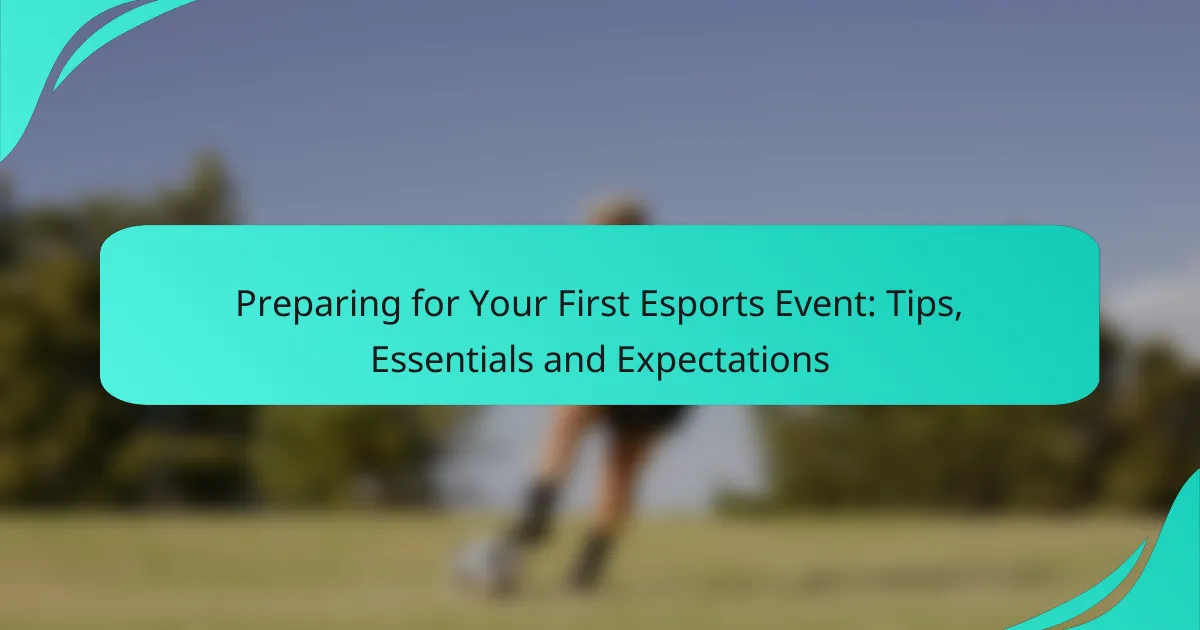Preparing for your first esports event is crucial for ensuring a successful and enjoyable experience. Familiarizing yourself with the event structure, game rules, and necessary equipment will help you compete effectively. Additionally, bringing the right essentials can enhance your comfort and performance, allowing you to fully engage in the vibrant atmosphere of competition and community interaction.
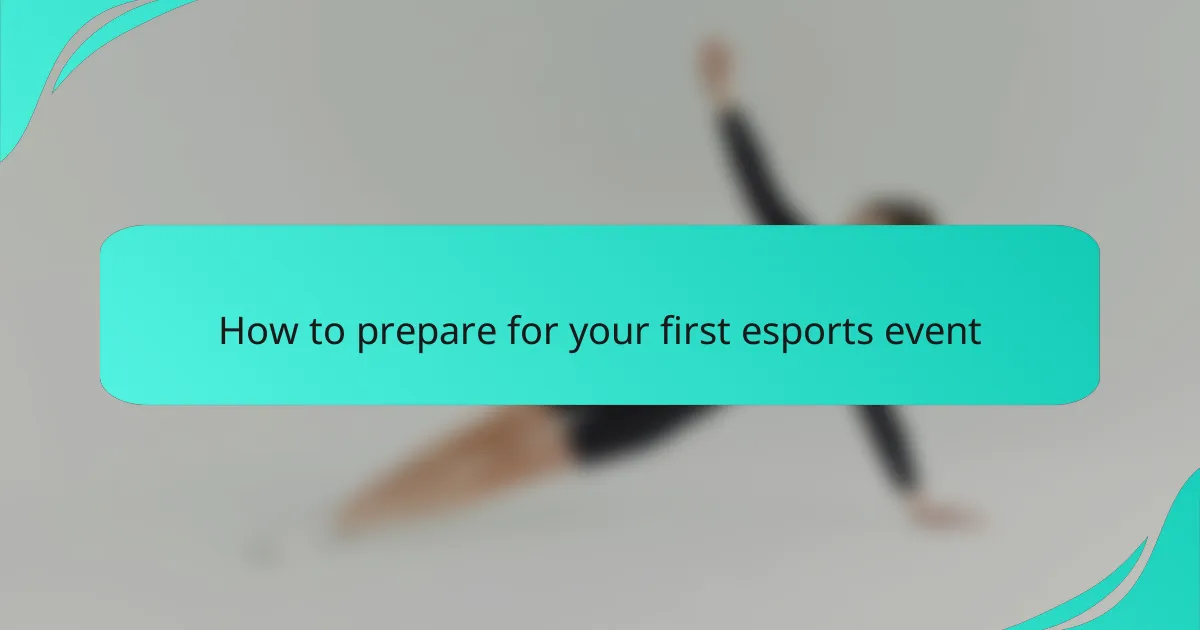
How to prepare for your first esports event
Preparing for your first esports event involves understanding the event structure, game rules, venue layout, schedule, and required equipment. This groundwork will ensure you are ready to compete effectively and enjoy the experience.
Research the event format
Understanding the event format is crucial as it dictates how matches will be played, including team sizes, elimination rounds, and scoring systems. Formats can vary widely, from single-elimination tournaments to round-robin leagues.
Check the official event website or community forums for details on the specific format. Knowing whether you will be playing in a best-of-three or best-of-five series can influence your preparation and strategy.
Understand the game rules
Familiarizing yourself with the game rules is essential to avoid penalties and ensure fair play. Each game may have unique regulations regarding character selection, item usage, and match conduct.
Review the official rulebook or guidelines provided by the event organizers. Pay attention to any specific rules that differ from standard gameplay, as these can impact your strategy and performance.
Familiarize with the venue
Getting to know the venue can help reduce anxiety on the day of the event. Visit the location if possible or look for virtual tours and maps online to understand the layout, including where the stages, practice areas, and amenities are located.
Consider the logistics of getting to the venue, including parking or public transport options. Knowing where to find food and restrooms can also enhance your comfort during the event.
Check the schedule
Reviewing the event schedule is vital for managing your time effectively. Schedules will outline match times, practice sessions, and breaks, allowing you to plan your day accordingly.
Be aware of any time zone differences if the event is held in a different region. Arriving early can help you acclimate and prepare without the stress of last-minute rushes.
Gather necessary equipment
Ensure you have all the necessary equipment ready before the event. This includes your gaming setup, such as a reliable computer, headset, and peripherals, as well as any personal items like snacks and hydration.
Check the event’s equipment policy; some venues provide gear while others require you to bring your own. Having backups for critical items, like a spare mouse or keyboard, can prevent issues during competition.
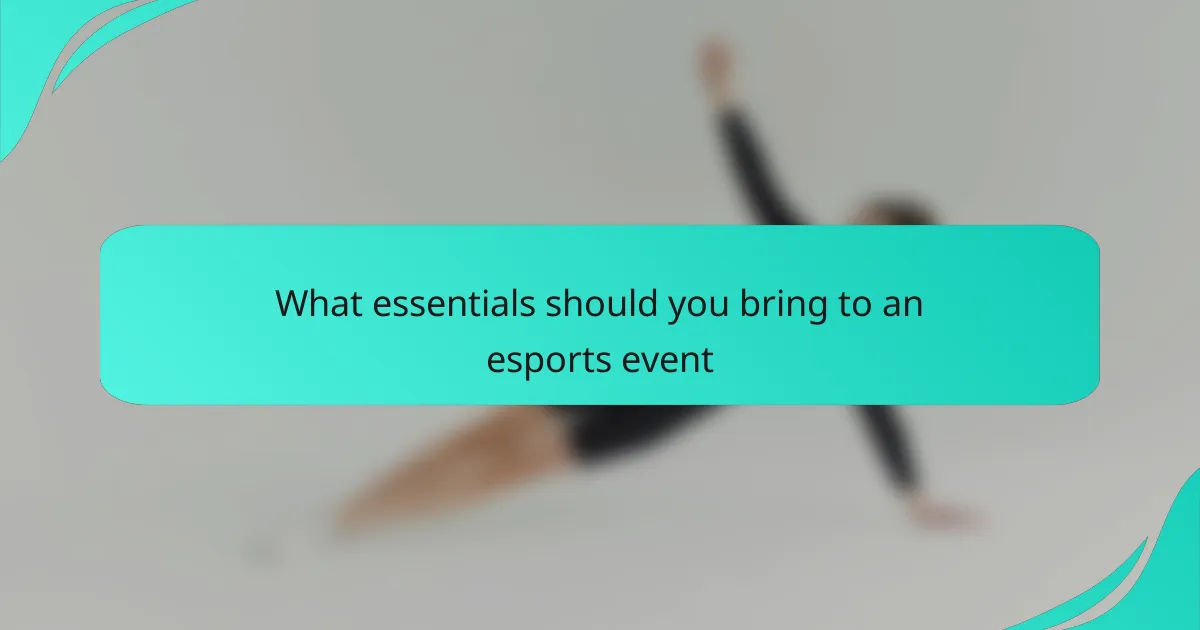
What essentials should you bring to an esports event
Bringing the right essentials to an esports event can significantly enhance your experience and performance. Focus on items that ensure comfort, functionality, and convenience during the competition.
Gaming gear and peripherals
Your gaming gear is crucial for optimal performance. Bring your gaming laptop or console, along with your preferred mouse, keyboard, and headset. Ensure all peripherals are compatible with the event’s setup to avoid last-minute issues.
Consider packing a mouse pad, controller, and any other accessories you regularly use. Having a backup for critical items, like a spare mouse or keyboard, can save you from potential disruptions.
Comfortable clothing
Wearing comfortable clothing is essential for long hours of gaming. Opt for breathable fabrics that allow for ease of movement and keep you cool. Avoid overly tight or restrictive outfits that may distract you during gameplay.
Layering is a good strategy, as venues can vary in temperature. A light jacket or hoodie can help you stay comfortable if the air conditioning is too strong.
Snacks and hydration
Maintaining energy levels is vital during an esports event, so pack snacks that are easy to eat and provide sustained energy. Options like nuts, granola bars, or fruit can be great choices.
Hydration is equally important; bring a refillable water bottle to stay hydrated throughout the event. Avoid sugary drinks that can lead to energy crashes.
Backup devices
Having backup devices can prevent potential setbacks. Consider bringing a second headset, an extra charging cable, or even a portable power bank for your devices. These can be lifesavers if your primary equipment fails.
Check the event’s rules regarding device usage and ensure your backups are compliant. This preparation can help you stay focused on your game without unnecessary interruptions.
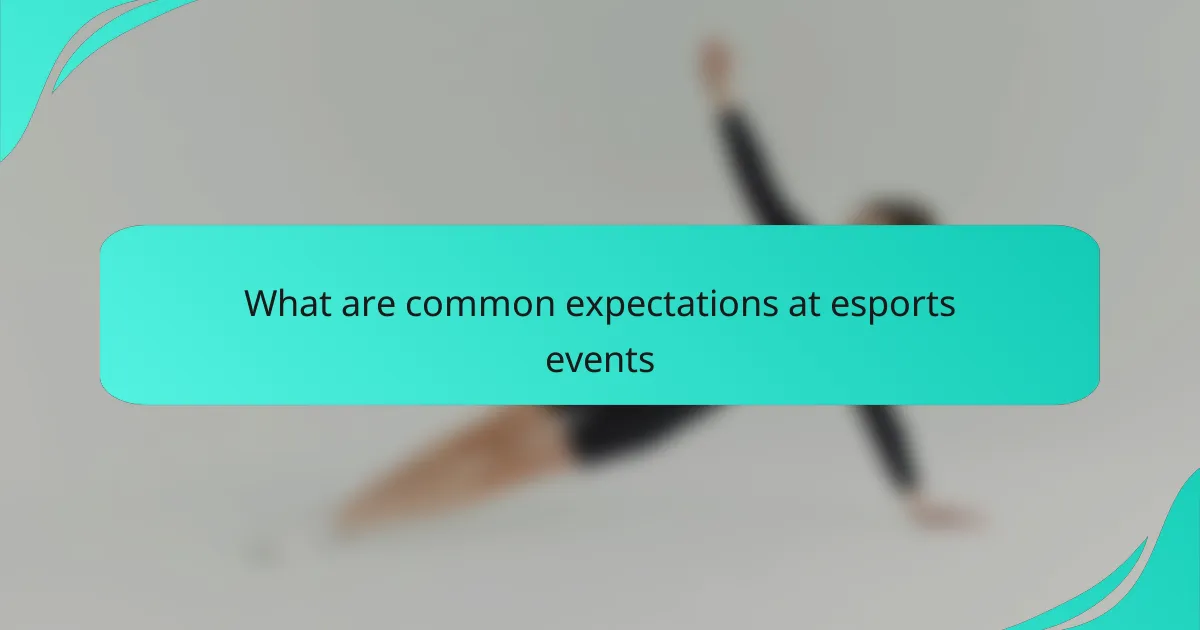
What are common expectations at esports events
At esports events, attendees can expect a vibrant environment filled with competition, community interaction, and a structured schedule. Understanding these elements can enhance your experience and help you prepare effectively.
Competitive atmosphere
The competitive atmosphere at esports events is intense and electric. Players and teams are often vying for significant prizes and recognition, which can create a high-stakes environment. Spectators can feel the excitement as matches unfold, with cheers and reactions echoing throughout the venue.
To thrive in this atmosphere, focus on your game and stay engaged. Avoid distractions and maintain a positive mindset, as the energy can be both motivating and overwhelming.
Community engagement
Community engagement is a key aspect of esports events, where fans and players connect over shared interests. Attendees often have opportunities to meet their favorite players, participate in discussions, and join fan activities. This interaction fosters a sense of belonging and camaraderie among participants.
To make the most of community engagement, consider attending meet-and-greets, participating in Q&A sessions, or joining social media groups related to the event. These activities can enhance your experience and help you build lasting connections.
Time management
Effective time management is crucial at esports events, as schedules are often packed with matches, panels, and activities. Knowing when and where events take place will help you prioritize your time and avoid missing out on key experiences.
Use event apps or printed schedules to track match times and locations. Plan your day around major matches you want to see, but also leave room for spontaneous activities. Remember to factor in breaks for meals and rest to keep your energy up throughout the event.
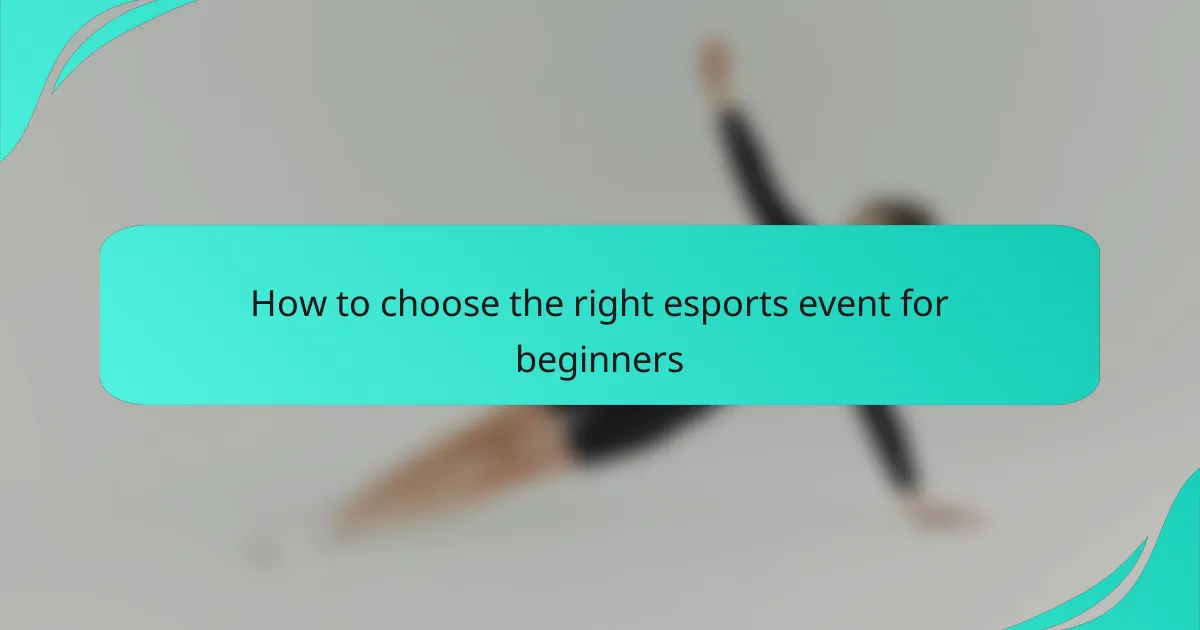
How to choose the right esports event for beginners
Choosing the right esports event as a beginner involves considering factors such as location, game popularity, and skill level requirements. Understanding these aspects will help you find an event that matches your interests and abilities.
Local vs. national events
Local events are typically smaller and more accessible, making them ideal for beginners. They often feature a community atmosphere, allowing you to meet other players and gain experience without the pressure of a larger competition.
National events, while more prestigious, can be more competitive and may require travel. If you feel confident in your skills and want to challenge yourself, participating in a national event could be a rewarding experience.
Game popularity
Selecting an event based on game popularity can enhance your experience. Popular games tend to attract larger audiences and more experienced players, providing a vibrant environment. Titles like League of Legends, Dota 2, and Fortnite frequently host events that draw significant participation.
However, less popular games may offer a better chance to succeed as a beginner. Look for events in niche games where competition may be less fierce, allowing you to hone your skills in a more supportive setting.
Skill level requirements
Understanding skill level requirements is crucial when choosing an esports event. Many events categorize players into different skill tiers, ensuring fair competition. Beginners should seek out events labeled as “novice” or “beginner-friendly” to avoid overwhelming competition.
Before registering, review the event’s rules and format to ensure it aligns with your current skill level. Participating in events that match your abilities will boost your confidence and provide a more enjoyable experience.
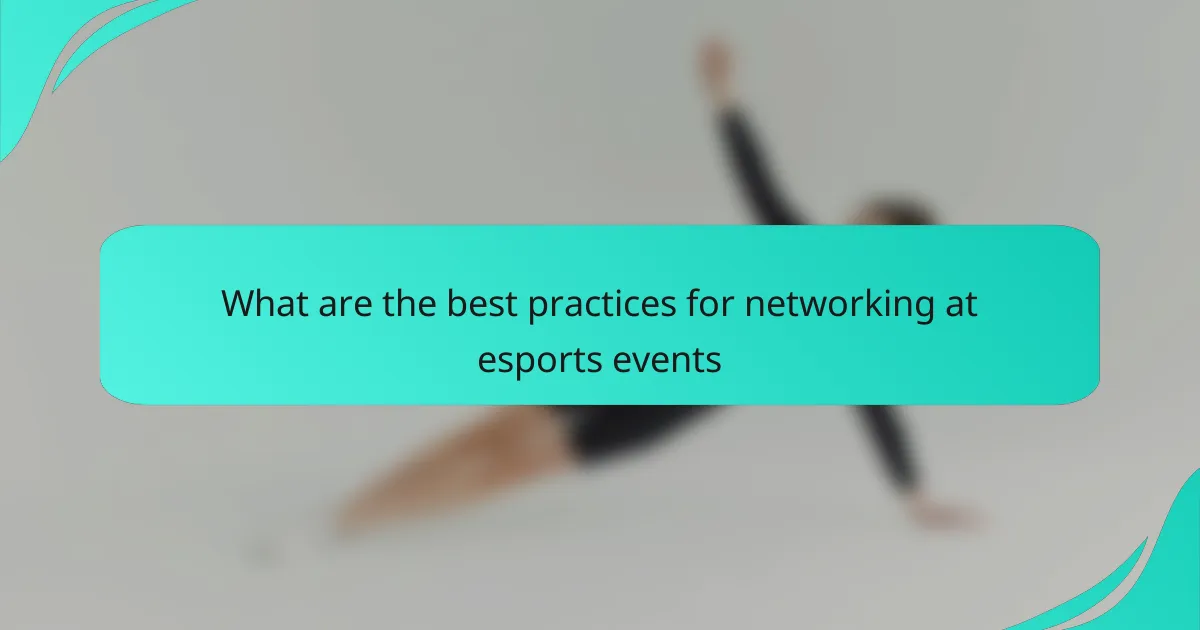
What are the best practices for networking at esports events
Effective networking at esports events involves building relationships with participants, sponsors, and brands. Focus on genuine interactions and leveraging social media to enhance your connections.
Engage with fellow participants
Start conversations with other attendees to share experiences and insights about the event. Ask questions about their favorite games or strategies to create a friendly atmosphere.
Consider participating in group activities or discussions, as these provide natural opportunities to meet others. Remember to exchange contact information to maintain connections after the event.
Connect with sponsors and brands
Identify key sponsors and brands present at the event and approach their representatives. Express your interest in their products or services, and inquire about potential collaborations or partnerships.
Be prepared with a brief introduction about yourself and your interests in esports. This will help you make a strong impression and demonstrate your enthusiasm for the industry.
Utilize social media
Use platforms like Twitter, Instagram, and LinkedIn to connect with fellow attendees and brands during the event. Share your experiences and tag relevant accounts to increase visibility and engagement.
Post updates or photos from the event to showcase your involvement and attract attention from others in the community. Follow up with new contacts online to solidify your networking efforts.
